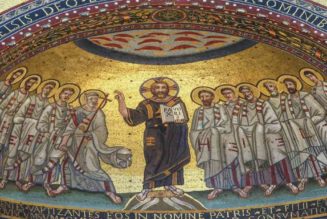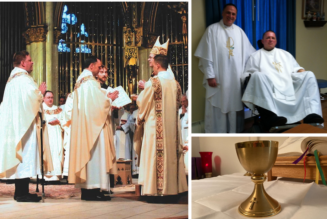
When my family entered the Church 22 years ago, some of my evangelical friends went out of their way to tell me Catholic horror stories. I hadn’t thought of this for years, but remembered it the other day when I was thrust into the company of evangelical Anglicans. At least one of them had been among the people who two decades ago told me the horror stories.
I’m guessing he and they would still tell them if they saw any point to it, but they rarely tell me the stories anymore, on the few occasions we meet. One of the unexpected blessings of having been in the Church this long is that people finally think of you as Catholic. From their point of view, you’re lost for good, like a ship sunk to the bottom of the ocean.
For a while, I think, they see new converts as being in what scholars call a “liminal” position. You’re on a border. You crossed a dividing line, but they think of you as just over the line and close enough that you might be convinced to come back.
They see entering the Church as like stepping across the Canadian border. You have to act like a Canadian and obey the nation’s laws while you’re there, but you can always step back over the border and return to America. For the convert, entering the Church is like crossing the border and going through all the requirements to become a Canadian citizen, and renouncing your American citizenship too. You feel you’ve found your real home.
You didn’t go through all that just to get something that meant so little to you that you could throw it away. You thought you should, in fact must, become something else. For you, conversion isn’t so much like crossing a border, but like crawling and climbing your way to the other side of a deep ravine. You really want to live in Canada, but your former peers don’t believe you.
I heard mostly versions of the same stories. Someone would say to me — in my experience without my asking them for their opinion — that he knew this Catholic guy who cheated on his wife and then went to confession knowing he was going to do it again, or heard of this horrible priest, or met this Catholic who loved the Rosary and couldn’t tell the Gospel of Luke from the letters of Paul. Now, from what I’ve seen in others’ experience, they bring up the sexual abuse scandal and assert it as proof of every anti-Catholic argument they have.
One popular line I got, possibly because I was mostly dealing with evangelicals, was stories of ex-Catholics who left because “they didn’t find Jesus in the Catholic Church.” Catholicism was all about following the rules and “works-righteousness” and making deals with God, but some people found “freedom in Christ” by leaving the Church. A variation of this was that they suffered from “that good old Catholic guilt,” as a friend liked to put it, from which “the Gospel” as articulated by evangelicals had delivered them.
Some people even suggested that I and other converts became Catholic because we wanted a simple, easy, by-the-numbers religion, not a “heart religion,” a “personal relationship with Jesus” religion. We wanted to hide from God behind the rituals and the rules.
Who Do They Think I Am?
I never quite understood why people, including some I didn’t know, said these things to me. They seemed to expect me to slap my forehead, drop to my knees, and cry out, “Oh, no! You’re right, I made a horrible mistake, I have to leave, what was I thinking, will you take me back, please please please?”
It was annoying. But it’s the pattern some of our friends follow. People who know you and had thought well of your intelligence and character suddenly decide you must be a dolt or a dreamer. They imply, indeed they really seem to believe, that you’ve made this life-changing decision without thinking it through.
When we decided to enter the Church (my wife agreed with me about this), I was serving at a very Protestant seminary, the sole support of a wife and four children, and assumed I’d be sacked. The year I arrived the school let go a teacher who had become Orthodox. We didn’t enter the Church without looking at it carefully for a long time.
They didn’t sack me, as it happened. (My being the dean’s editor had something to do with that, I think.)
Credulous Friends
Looking back at those days, one thing I remember is how credulous my friends were. Some were academics trained in evaluating evidence, but they never doubted these stories. And they always believed the stories represented something fundamentally wrong with the Church — something essentially wrong, wrong with the thing itself.
They didn’t seem to ask the basic questions that you should ask of any such story: Is it true? And if it’s true, does it matter? We evaluate critical stories about people we know and like this way. If someone tells you that you should avoid Bob because he has a bad temper, you’ll ask if that’s really true, and if it is, you’ll ask what he does when he’s angry. It matters if he hits people when he’s angry. It doesn’t matter if he keeps it to himself.
Nor did they ask the third question a serious inquirer should ask: If it’s true, how do the people on the other side understand it? Is there another way of seeing the same fact, another reasonable way of thinking that leads to a different conclusion? Are they blind and deluded or do they simply see the world differently?
And they never, in my experience, ask the fourth question they should ask: Is this charge true of my side? They should ask this question for two reasons. First, do they need to get their own house in order before criticizing anyone else’s? Are they throwing stones from a glass house? Second, do they have experience that would help them understand their targets? Do they know from the inside the problem they see in Catholicism, and thereby know their charge isn’t so conclusive as they think?
Having been the target of this kind of criticism — which was both well-meant and predatory — I felt about it as Chesterton described the criticism of Christianity he had dealt with: “It looked not so much as if Christianity was bad enough to include any vices, but rather as if any stick was good enough to beat Christianity with.”
It’s a kind of initiation ritual, if you have the kind of friends and acquaintances who do this kind of thing. I did, because I lived in a world in which these things mattered — which was a good thing. My advice to anyone who has the same kind of friends is to accept the remarks as part of the process of entering the Church, part of the price you pay for the blessings of being inside and not outside.
Don’t try to answer them, even if you can, because the answers take more time to give than most of them want to give you. They’re no more patient with your reasons for remaining a Catholic than you would be rescuing a drowning friend who says he wants to keep swimming. You can quickly find yourself deep inside a very confusing conversation. You’re probably not called to do this sort of thing anyway.
I suppose if you know the would-be rescuer might listen, you might share one of the aspects of the Catholic life that drew you in, something that helps you better love God and man. That might get past their prejudices. But in most cases, you can only smile and change the subject.









